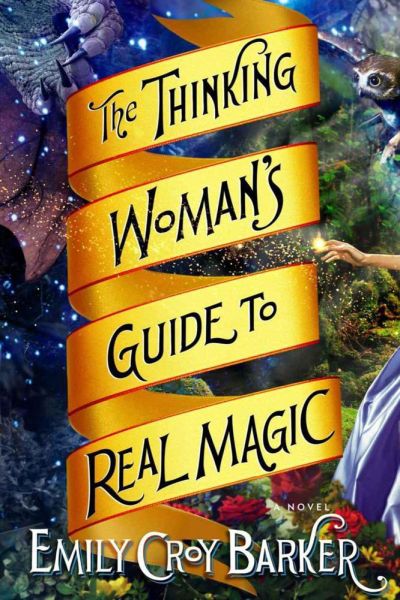Beguiled Again
The Thinking Woman’s Guide to Real Magic (Real Magic, volume 1)
By Emily Croy Barker

16 Jul, 2024
2013’s The Thinking Woman’s Guide to Real Magic is the first volume in Emily Croy Barker’s Real Magic series.
Facing abject failure in both personal and academic life, Nora seeks distraction. Setting off on a walk in the woods, Nora becomes disoriented and hopelessly lost.
Ilissa is happy to offer Nora hospitality. Nora would have been better off in the earthly wilderness.
Beautiful Ilissa is charming… literally. Nora descends into a mental fog, too befuddled to think deeply about the perplexing, contradictory endless party in which she seems trapped for life. Courted by Ilissa’s son Raclin, Nora is too stupefied to ask some important questions.
Ever fond of wandering off into uncharted wilderness, Nora encounters Ilissa’s hostile and archaically dressed neighbors. They are surprised to discover that Nora is human. When Ilissa sends an emissary to collect Nora, the neighbors grudgingly acquiesce. However, before Nora is taken away, the mage Aruendiel provides Nora with the means to call for help should she need it.
One miscarriage later and the reality of her plight begins to become clear to Nora. Her hosts are not human. They are Faitoren, elves by another name. Their appearances are illusions. Nora’s husband Raclin is closer to dragon than human. Nora was lucky to lose the baby, as its full-term birth would surely have killed her.
One rescue later and Nora is ensconced in Lord Aruendiel’s household. For the moment, it does not seem practical to send her back to her home dimension. To fill the time, Nora badgers a reluctant Aruendiel into mentoring her in magic.
Luckily, Nora is one of the rare few humans who have a knack for magic. Less luckily, Ilissa and Raclin consider Nora stolen property. Nora’s escape may be all too temporary.
~oOo~
The novel offers some blatant sequel hooks. A sequel, How to Talk to a Goddess, followed in 2021. I wonder why the eight year delay?
This seems to be the week for books featuring graduate students whose studies aren’t going well thanks to the students’ unfortunate choices. In this case, Nora was warned by her advisor:
“Nora, when you chose your topic, we discussed the pitfalls of writing about a canonical author like John Donne. It can be difficult to find unplowed ground.”
Having ignored the warning, Nora seems baffled that there is fact no unplowed ground, at least none she can find.
Nora falls into that plot-facilitating set of people who are very smart in specific areas — she is a quick study — while being oblivious in many others. In fact, in pretty much every respect save an ability to learn quickly, Nora’s a dullard. She cannot see that her thesis is unworkable1; she cannot see her boyfriends’ obvious flaws. Nor is Nora quick to pick up on the fact that other nations, let alone other worlds, differ culturally from the USA in important ways.
Nora compensates by being very lucky. Aruendiel, one of the few mages able to reliably defeat Faitoren2, takes pity on her and rescues her. He offers her refuge not merely from the Faitoren, but also from a human society where women are closer to livestock than citizens. Time and again, Nora makes poor choices that she survives thanks to her hard-working host… and also friends like Hirizjahkinis.
That’s a long synopsis. Well, it is a long novel. Thinking Woman was a lingering tour of an utterly conventional setting and a disappointing heroine. I found myself wishing that the author had chosen as her protagonist, not Nora, but Hirizjahkinis. She’s smart, capable, and she has mastered magic. She would have made a far more interesting protagonist than vapid Nora and would have fit the title far more closely than Nora does.
Still, the novel isn’t dreadful. It’s just not a challenging or interesting read. But if you are looking for a novel about a somewhat ditsy modern woman trapped3 in a stock magical secondary world, you might consider The Thinking Woman’s Guide to Real Magic.
The Thinking Woman’s Guide to Real Magic is available here (Amazon US), here (Amazon Canada), here (Amazon UK), here (Apple Books), here (Barnes & Noble), here (Chapters-Indigo), and here (Words Worth Books).
1: Nora’s lack of introspection might work in her favor. It seems to have shielded her from the trauma of finding herself a drugged Fae sex slave and pregnant by a dragon.
2: Aruendiel is one of the few inhabitants of Nora’s new world who have visited our world. He might be patient with her because he has dealt with her like before.
It does not seem all that difficult to wander from our world to Aruendiel’s. I wonder why it’s inconvenient to send Nora home. I also wondered why there’s no interworld trade (such as takes place in Charles Stross’ The Family Trade series). Will there be trade in the second book? Somehow I doubt it.
